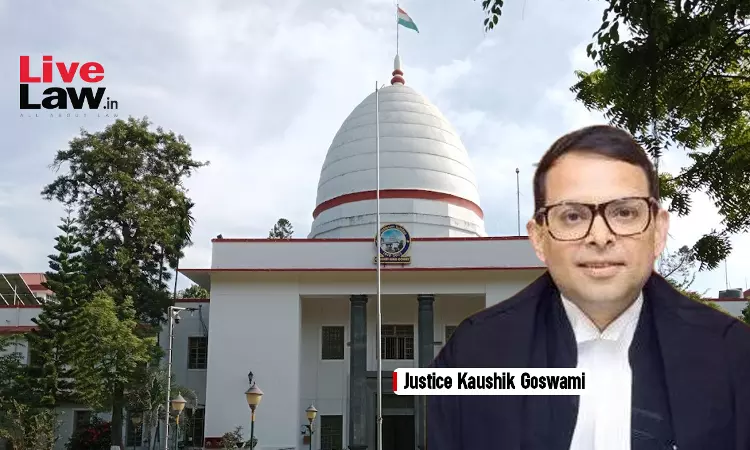- Home
- /
- High Courts
- /
- Gauhati High Court
- /
- Robust Policy, Regular Training:...
Robust Policy, Regular Training: Gauhati High Court Suggests Measures To Protect Children From Sexual Exploitation
Udit Singh
30 May 2025 12:00 PM IST
The Gauhati High Court recently issued measures for safeguarding children from the menace of sexual violence and exploitation. The single judge bench of Justice Kaushik Goswami observed:“…under the Constitution of India, it is the obligation of the state to protect children. I cannot also be unmindful of the fact that children due to their tender age are often vulnerable to sexual...
The Gauhati High Court recently issued measures for safeguarding children from the menace of sexual violence and exploitation.
The single judge bench of Justice Kaushik Goswami observed:
“…under the Constitution of India, it is the obligation of the state to protect children. I cannot also be unmindful of the fact that children due to their tender age are often vulnerable to sexual predation. Younger children are even incapable of distinguishing between safe and unsafe touches. I am thus of the firm view that it is imperative that all stakeholders including child protection stakeholders, functionaries, and educational institutions, take proactive and stringent measures to safeguard children from the menace of sexual violence and exploitation…”
The Court highlighted the following measures:
- Robust Child Protection Policy: Every school, whether government or private, can formulate and implement a comprehensive Child Protection Policy, which may also include SOPs on addressing cases of child sexual abuse.
- Regular Trainings: All schools can organize regular trainings on child protection and prevention of child sexual abuse for staff, parents, and students, to create awareness and equip them with the necessary skills to prevent and respond to such cases.
- Child Protection in Curriculum: Education Department may take measures to incorporate child protection as a part of school curriculums to empower children with age-appropriate information and knowledge on their rights and protection.
- Awareness Sessions: Child protection stakeholders, including State Commissions for the Protection of Child Rights (SCPCR), Child Welfare Committees (CWC), District Child Protection Units (DCPU), Special Juvenile Police Units (SJPU), and State and District Legal Services Authorities (SLSA/DLSA), can conduct regular awareness sessions on child sexual abuse and the POCSO Act in schools and communities. Technical assistance may be sought from credible NGOs working on child rights and child protection to achieve desired outcomes. Information, Education and Communication (IEC) materials in local languages could be circulated and published widely in schools and communities through social workers, Gram Panchayats/Village Council (VC), Anganwadi workers, Shiksha Karmis, Accredited Social Health Activist (ASHA) workers among others, to generate awareness at scale.
- Media Awareness: Media organizations may attempt to feature regular talk shows and short films generating awareness on child sexual abuse, to educate the public and promote prevention.
It was further noted by the Court that if such an initiative is undertaken with utmost sincerity and commitment, it would effectively shield every child from the scourge of child sexual abuse.
“Therefore, given the gravity of the issue, it can only be expected that all stakeholders work collectively to take effective measures to protect children from the threat of child sexual abuse. Let a copy of this judgment & order be furnished to the Chief Secretary to the Government of Mizoram, to look into the matter and to take necessary steps for the protection of children from sexual abuse and exploitation,” the Court said.
The said measures were issued during the hearing of an appeal against the judgment of the Trial Court by which the accused-appellant was convicted under Section 6 of the POCSO Act, 2012, and sentenced to undergo rigorous imprisonment for a term of ten years with a fine of Rs. 5,000/-.
The Court upheld the judgment of the Trial Court by observing that the trial Court has based its conviction on the sole testimony of the victim, which is totally trustworthy and of sterling quality.
“Hence, I am of the unhesitant view that the trial Court has not committed any legal infirmities whatsoever in convicting the accused/appellant by the impugned judgment & order under appeal. That being so, the appeal is bereft of any merit whatsoever. Hence, the criminal appeal fails,” the Court said.
The Court further noted that there has been a steep rise in offences relating to sexual assault and sexual harassment of children under the POCSO Act, 2012, in the State of Mizoram.
“It appears that despite stringent punishments prescribed under the POCSO Act, 2012, being enacted to protect children from offences of sexual assault, sexual harassment, among others; children are continuously being sexually exploited and abused. Undoubtedly, child sexual abuse is a grave and serious concern. The situation is thus alarming, and unless it is appropriately and adequately addressed, the best interest and well-being of the child shall remain endangered, and in jeopardy,” it noted.
Citation: 2025 LiveLaw (Gau) 21
Case Title: Sh. Laldinsanga v. State of Mizoram & Anr.
Case No.: Crl. Appeal (J) No. 24 of 2024



